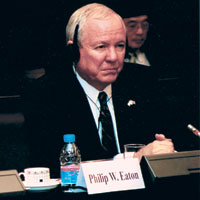 |
|
Spring 2007 | Volume 30, Number 1
| Campus
|
|
|
Destination: Asia
Eaton joins historic delegation of U.S. university presidents in South Korea,
Japan, and China

President Eaton meets with Chinese university presidents in Beijing. |
The bus zigzagged down the streets of Seoul, South Korea — sometimes off-road, always high-speed. As it careened through nighttime city traffic, Seattle Pacific University President Philip Eaton and 11 other American college and university presidents on board were relieved to hear the driver yell, through a translator, “There are seatbelts, folks!”
Eaton laughs as he recalls the harrowing journey. “Our bus was at the back of the motorcade, and our driver struggled valiantly to keep pace,” he explains. “We grabbed for those seat belts!”
Eaton and his colleagues were in Asia with U.S. Secretary of Education Margaret Spellings and U.S. Assistant Secretary of State Dina Habib Powell. The group formed a high-level delegation, traveling to Japan, South Korea, and China, November 10–18, 2006. Cast as international ambassadors, the presidents carried the message that the United States welcomes international students and is eager to form educational partnerships with Asian nations. Eaton was the only president of a Christian institution and the only president from the Northwest United States invited to participate in the delegation.
Global education, says Eaton, is a priority for SPU. In January 2006, he was also asked to join a group
of 100 presidents in Washington, D.C., for the University Presidents’ Summit on International Education. Co-hosted by Spellings and Secretary of State Condoleezza Rice, the event was a first-of-its kind dialogue between government officials and academic leaders about the future of U.S. higher education in the global arena.
In the past year, Eaton has been leading Seattle Pacific faculty, staff, students, and trustees in strategic conversations about how the University can become more intentionally global. “We risk falling behind unless we
feel the heat,” says Eaton. “There is no room for complacency. China is building a world-class educational system. They have more than 250 million students, and every one of them
is learning English, beginning in kindergarten. They also have an intense focus on science, math, and engineering.”
Spellings agrees. “I talk to CEOs of Fortune 500 companies all the time,” she said to a crowd of students that gathered to greet the American presidents at Seoul’s Sungkyunkwan University. “They consistently tell me that to compete in the global marketplace they need college graduates who know math,
science, and foreign languages, and who have problem-solving skills. And these days, companies are following the talent — whether that talent is in Seattle or Seoul.”
Despite the fact that China and other countries are aiming to build the world’s finest educational systems, various Chinese university presidents told Eaton that the U.S. education system has something they are lacking. “We know how to bring creativity and inventiveness to the learning process,” explains Eaton. “Our system generates new ideas in ways that theirs does not. We must keep that distinctive edge even while we extend our intentional reach globally.”
Eaton relates a sense of urgency about Seattle Pacific’s call to global engagement,
at the same time saying that the University has a strong foundation on which to build.
For instance, SPU has defined its signature commitments in global terms. “We are approaching our work and study from a global perspective,” underscores Eaton, “but the opportunities and challenges are enormous. There is room and need for us to do so
much more.”
What exactly SPU will do differently with regard to global education in the future is a matter of campuswide discussion, says Eaton: “SPU is rethinking its focus. We are not changing our vision, we are expanding it.
We are digging down, sinking deep into our roots and into the Christian story. Global engagement, training missionaries — these things are deep in our DNA. The question is how to equip ourselves and our students to reach across the globe even more effectively in a day of rapid, volatile change.”
Up for discussion are strategies aimed at increasing the number of Seattle Pacific University students and faculty who are “airborne” (studying and teaching abroad) each quarter and bringing more international students and faculty to campus. Eaton points out that
80 percent of Free Methodist church members now live in the global south: Africa,
Asia, and Latin America. What would it look like, he wonders, if the University tapped
into the potential to build relationships outside of traditional geographic borders?
“We have something profoundly important to bring to the table,” says Eaton. “We have the transforming gospel as a part of our mission. I’m proud to say that we are equipping global leaders to engage the culture and change the world, and will seek to do that even more effectively into the future.”
— by Jennifer Perrow
— Photo courtesy of U.S. Secretary of Education
Back to the top
Back to Campus Home
|
| |
|
 |
|
 |